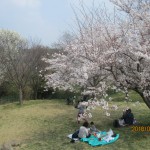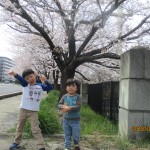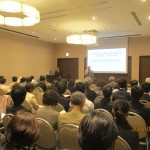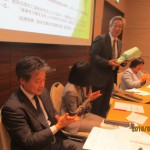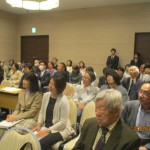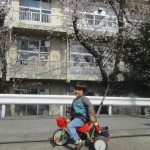今日(28日)は天気もよくお花見日和。
家族の意見が一致して、成田市のさくらの山の公園(www.enarita.net/)へ、桜の花と飛行機を見に行く。
家から車で30分ほど。桜は満開で、そこに降り立つ飛行機も優雅。
ただ、最初はいつもの場所で待てども1台も飛行機が降り立ってこず、飛行コースが変わったのかと思ったが、帰りかけたた時1台の飛行機が降り立ち、その後もそれに続いた。時間や風の向き等によって飛行のコースが変わるのかもしれないと思った(真相はよくわからない)
月: 2018年3月
桜の季節2
敬愛パネル 「多文化共生社会と日本―教育の視点から」テーマ案
1 外国籍の子どもの数の推移は、国別も含め、今後どのように変化していくのか。日本政府は、どのような政策をとろうとしているのか。県や市町村はどのような対応をすべきか。また地域社会の人々のなすべきことは何か。(→水口)
2 各国の多文化共生の歴史をみると、いくつかのパターンがある。日本がモデルにすべき国はどこか。(→松尾)
3 多文化共生社会の教育で求められる視点は、平等(国籍に関係なく平等に扱う)という視点と同時に、何が必要か。(→松尾、清水)
4 学校には見えにくい文化や差別があると言われるが、それはどのようにしたら顕在化できるか。また克服できるのか(→松尾、清水)。
5 外国籍の子どもは、日常言語と学習言語は違い、前者は容易に学べても後者の学びが難しいと言われるが、それはなぜか。どのような方法で、学習言語は学べるのか。(→ 佐々木、元吉)
6 外国籍の子どもの母国の文化や母語の保持は必要か。それはどのような方法で可能なのか。ダブルリミテッド(母語も日本語も中途半端で、思考言語が育っていない。学力が身につかない)をどう克服するか。(→清水、佐々木、元吉)
7 外国籍の子どもへの指導には、「日本語指導」「教科指導」「適応指導」の3つがあると言われるが、それぞれ何が大きな課題であるのか。(→清水、元吉)
)、
8 外国籍の子どもの学力の保証やアイデンティティ形成は、なぜ大切か。これは、子ども達の将来設計と関係があるか。(→清水、佐々木)
9 ナショナリズムが高まる中で、多文化教育をどのように考えればいいのか。
(→ 水口、松尾)
10 外国籍の子どもへの教育が、日本の学校のあり方や学校文化への問い直しや日本の教育が豊かになるといわれるが、それはなぜか(→松尾、佐々木)。
「多文化教育」メモ」
1 多文化教育や異文化間教育的視点は、単一文化的視点(メルティングポット)や比較文化的視点(旅行アプローチ)とは違い、マイノリティ(弱者)の立場に立ち考えることであること。またマジョリティーも異文化(マイノリティー)とまじわることにより自分達も豊かになるという意識をもつ視点である。
2「外国につながる児童の存在は、本校児童の学習活動のための資源の1つとなっている。より効果的な活用を図ることにより、学校教育目標の具現化につながるものと考えている。
また、変化が激しい社会情勢の中、児童個々の違いを認め合える環境での学習活動が児童個々の成長を効果的に高めると感じている。」(佐々木惇、高浜小学校校長のことば)
3 多文化教育で、大事なことは、多様な見方を理解し、許容することである。その際に、バンクスの「転換アプローチ」は有効な方法である。他国や他者の立場から,同じ事象を見てみる。たとえば、第2次世界大戦や広島・長崎への原爆投下を、日本の視点からだけでなくアメリカの視点からもみてみる。「原爆教育」は、日米で行われている。
4 「ニュカマーの家族は、自分たちの日本への移動に、それぞれの「家族の物語」を有していた。そしてそれに対応した形で、個別的な「教育戦略」を採用して、日本の社会に適応しようとしている」(出稼ぎニュカマー、難民ニュカマー、上昇志向ニュカマー)(志水・清水編『ニュカマーと教育』明石書店,2001.p.364)
5 経済がグローバル化する中で、国を超えた物的人的交流が起こるのは必然であり、他者(当たり前を共有しない人)との関係を築き、「不快さに耐える」ことが必要。多文化教育を、理想だけでなく、現実的に考えることも必要。
追記1
敬愛大学のシンポジウム「多文化共生社会と日本」は明日(27日)、千葉の駅上のペリエのホールで開催される。
登壇する清水睦美氏の最近の論文を読むと、ニュカマー研究は、第2世代の問題に移っていることがわかる。下記で、清水氏の論文が読める。
ベトナム系ニューカマーのトランスナショナルな実践 – 日本女子大学学術 …
https://jwu.repo.nii.ac.jp/index.php?action…view…
追記2
敬愛大学のシンポジウム「多文化共生社会と日本」は、4人のシンポジストの内容のある講演があり、参加者も70名近くで満席で、成功裡に終わった。
ただ、討論者としての私のまとめがあまりうまくいかず、心残り。
パネルディスカッションは瞬時に的確な発言を求められ、議論に集中して的確に発言できればなかなか快感なのであるが、私の歳なのかの(?)そのような集中力がはたらかず、しどろもどろの発言に終わり後悔が残った。
桜の季節
the cellphone zombies
卒業生のI氏より今年の英語の入試問題の紹介があった。
内容は、今のアメリカの若い人が景色のいいところに行っても携帯ばかり見て、景色を楽しまないし、人との直接のコミュニケーションもしないという、前の世代からの嘆きのようなものである。
前世代が後世代の行動を嘆くのはどこの国も同じだなという感想と、昔我々の世代も景色のいい宿に行き景色は楽しまず麻雀三昧にふけっていたことがよくあったということを思い出し、またまアメリカ人が通りがかりの見知らぬ人に挨拶するのは、他者への親愛の情からではなく警戒心があるからという藤原新也の解釈を思い出した。
入試の英語の問題は、英語の文章のよさから選べれるのであろうか、それとも内容からであろうか。
Depressed by politics? Stop staring at phones by Stephen L. Carter
NEW HAVEN, CONNECTICUT – My wife and I decided to take advantage of the spring-like weather this past week and head for the beach. We were not surprised to find that others hあろad the same idea. Foot traffic was so thick on the boardwalk that we could move only at a sluggish pace. We didn’t care. We were there to look at the dark, beautiful winter water, gently lapping up close, frothy further out. Visually, we drank our fill.
But what struck us as remarkable was how many of our fellow promenaders had no interest in the view. These were the cellphone zombies. There they were, on a crowded beach on the warmest day of the year, faces buried in their phones. Had the Long Island Sound vanished in a silent puff of mystical energy, I doubt they would have noticed. How the cellphone zombies avoided colliding with each other is a question best left to Stephen King.
Whatever works on the boardwalk, it fails on the roads. Lately we read that drivers using their phones are causing so many collisions that insurance premiums can’t keep up. Half of teenaged drivers surveyed admit to texting while behind the wheel, and a two-second glance at the screen exponentially increases the likelihood of an accident. Holding a phone in the hand makes things worse, but, as Tom Vanderbilt notes in his 2009 book “Traffic,” statistics for hands-free phones are not much better.
OK, all of this is reasonably well-known. (Maybe not the hands-free phone bit, which was news to me, but the rest.) Cellphones can be dangerous, but the zombies at the beach weren’t behind the wheel. True, even distracted pedestrians seem to be having more accidents. And there is growing evidence that young smartphone users exhibit the same behavior as addicts.
But my libertarian conscience does not want to tell anybody else how to live. If people want to come to the beach on a warm winter day and ignore the view, they should have the same freedom as anybody else to enjoy themselves in their own way. True, the zombies turned out to be the ones slowing foot traffic, and in that sense were uncivil. Given, however, that the zombies constituted a large majority of those strolling along the boardwalk, perhaps our norms of civility need rewriting.
Color me old: I can remember when strangers greeted each other on the street. There is a warmth in such behavior, a welcoming, a mutual assurance that each of us belongs. In the days of Jim Crow, many of the norms that supported the segregationist state were informal. Among them was the notion that white men would greet other white men whom they happened to encounter on the sidewalk but would ignore black men, who would be expected to stand aside. (The norms for women were more complex.) Nowadays on campus, students literally bump into their professors, and, noses buried in their cell phones, bounce off and keep moving without a word.
Of course nobody has an obligation to greet anyone else on the street. But social psychologists who study the effects of technology warn us that the lack of acknowledgment creates an “absent presence.” When we are ignored by those around us, stress levels rise. The fight-or-flight reflex might even kick in. Presumably these effects are minimal or absent in the zombies themselves: they do not notice those around them, and therefore could hardly respond to being ignored. But for those whose faces happen not to be buried in their phones, the stress effects of being surrounded by zombies are in the long run probably deleterious to health.
The obvious response is that we no longer live in a civil era. Almost two decades ago I published a book called “Civility: Manners, Morals, and the Etiquette of Democracy.” There I defined civility not principally as good manners (although I do believe that manners matter) but as the sum of the sacrifices we make for the sake of living together. Fans of the volume (thank you, by the way) have been asking lately whether I might perhaps bring out a revised edition, to take account of our depressing national politics.
Perhaps at some point I will. But I do not see our politics as the cause of our growing incivility. Our politics is the fruit of our growing incivility. If we expect better from officeholders and candidates and activists, we have to demand better from ourselves. A good place to start might be saying hello on the street. If that’s too big a change, how about if we all look up from our screens a bit more often and enjoy the view.
